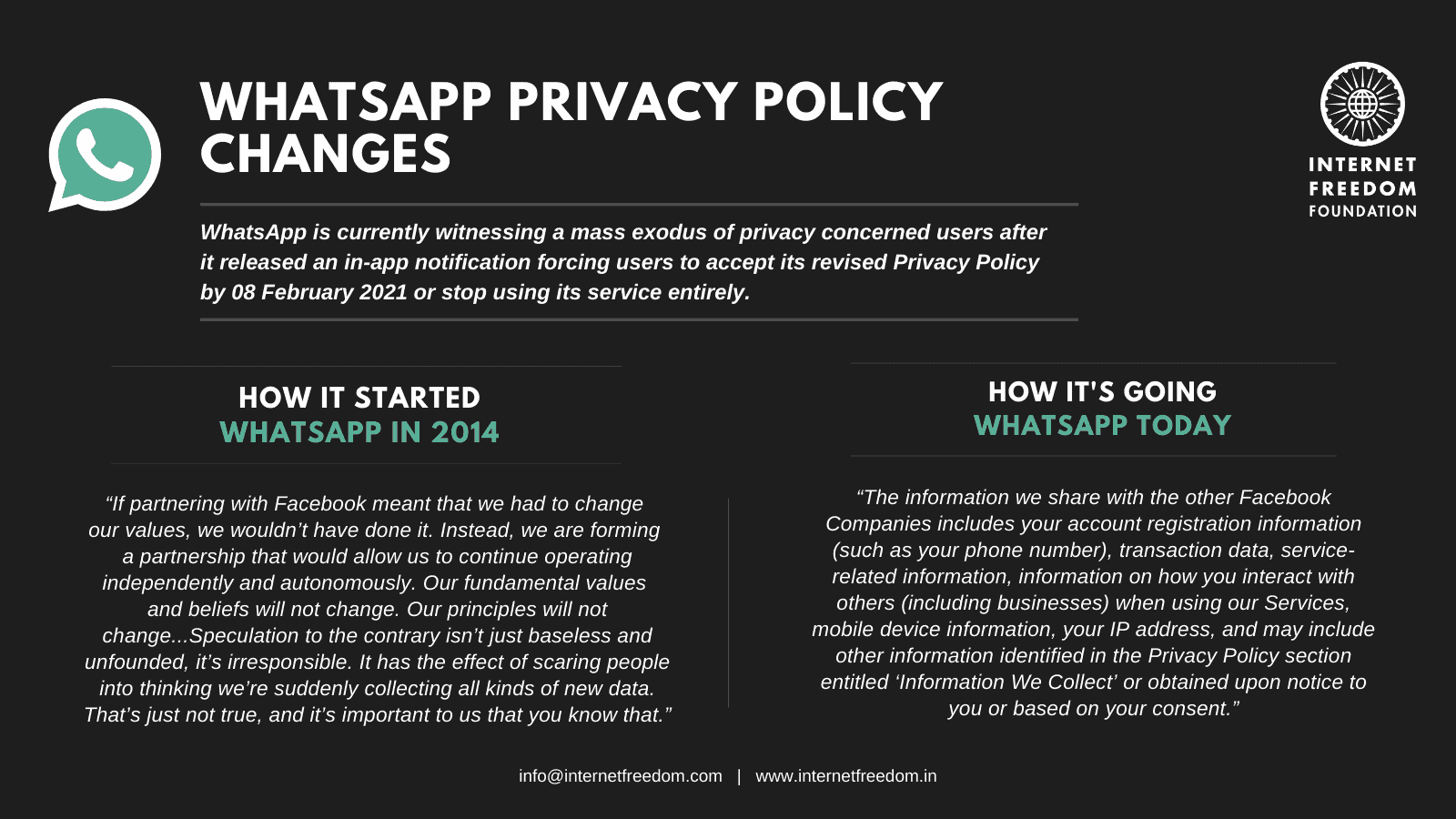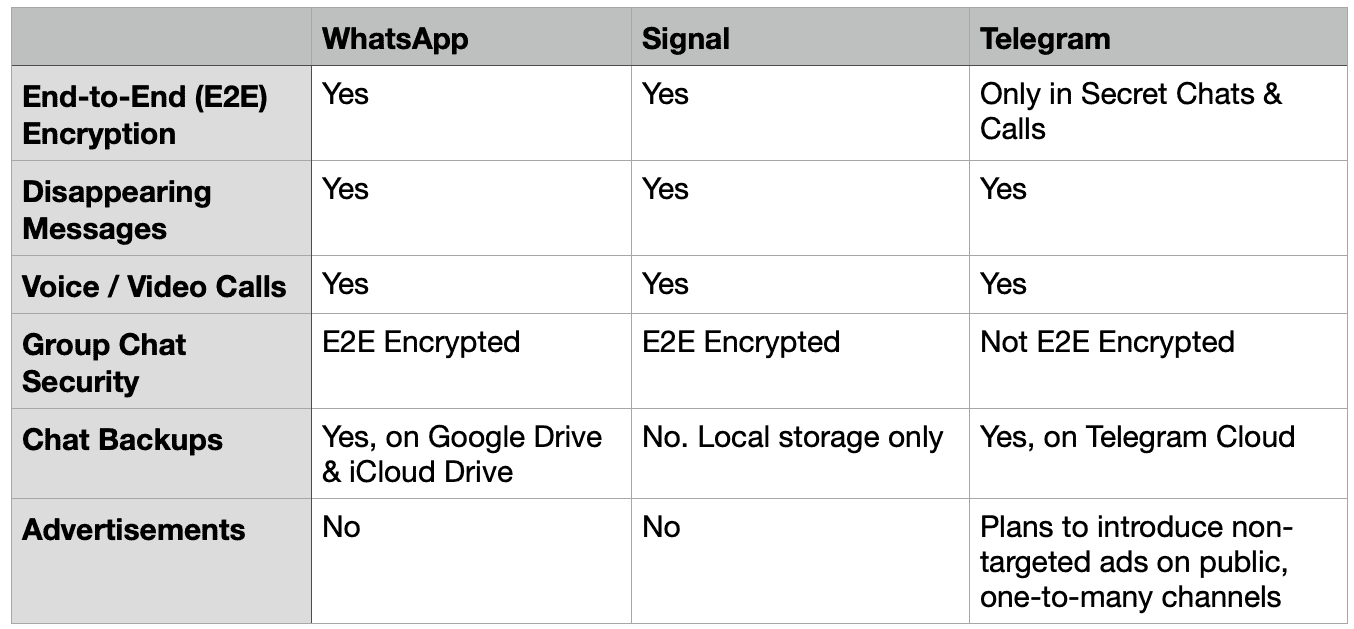WhatsApp started rolling out a pop-up notification to its users about changes in its privacy policy that users have to agree to in order to continue using the app after February 8*, 2021. The notification has created a lot of panic and confusion among the users, and many are switching to alternate messaging platforms for the fear of data sharing with Facebook.

In reality, WhatsApp has been sharing data with Facebook for years now. But, so far, users could opt-out of this data sharing from WhatsApp Settings. This time, the new privacy policy update makes data sharing with Facebook mandatory, along with a few other changes to specify how data sharing works for users interacting with WhatsApp Business accounts.
In this article, we’ll try to break down the changes stated in WhatsApp’s Privacy Policy in a way that’s easy for users to understand.
*Update: Just as we were about to publish this article, WhatsApp announced that it was going to now delay the new privacy policy changes by three months, following the mass confusion about data sharing with Facebook and migration of users away from the platform. The new privacy policy updates now take effect on May 15, 2021.
Key Updates in WhatsApp Privacy Policy
As mentioned in the in-app prompt, the new privacy policy focuses on three key areas of change:
- The WhatsApp service and how it processes your data
- How WhatsApp services will integrate your experiences with other apps and services belonging to the Facebook family of products
- How WhatsApp Business accounts will be able to leverage Facebook-owned tools to manage their customers across the Facebook family of products
Essentially, these updates will enable Facebook to use the data it can gather from WhatsApp, to serve you personalized ads and tailored recommendations within the Facebook family of apps. These recommendations will be based on the interactions you have across various Facebook apps and services, including but not limited to Facebook, WhatsApp, Instagram, and Messenger.
What about End-to-End Encryption?
But hang on, would Facebook be able to read your WhatsApp chats?
The short answer is no. WhatsApp chats are still end-to-end encrypted. Anything you share with your contacts on WhatsApp, be it messages, photos, videos, voice notes, contacts, locations, etc., are encrypted with your and your chat partner’s key pair. Only you and your chat partner(s) have the keys to decrypt each other’s messages locally on-device. Your chats can’t be read by WhatsApp, Facebook, or any other third-party while in transit or even when stored on WhatsApp servers.
That being said, WhatsApp does use file hashes and other identifiers to verify the integrity of the attachments being shared in order to deliver them more efficiently.
For example, WhatsApp temporarily stores media files and chats in encrypted form on their servers until they are delivered to the recipient. WhatsApp says it deletes chats automatically from their servers once they are delivered. If undelivered, chats are automatically deleted after 30 days. When media is being shared repeatedly (viral content), WhatsApp can track whether the particular photo or video is being shared or forwarded by multiple users using hash-based file verification without the knowledge of the actual content being shared, and may choose to retain the particular file on their servers in an encrypted format for a longer duration for better efficiency.
What user data does WhatsApp collect?
So, messages on WhatsApp are still end-to-end encrypted, and technically, WhatsApp cannot access your chats. But WhatsApp does collect Personally Identifiable Information from data outside your chats. This includes:
Your Account Information: Includes your profile photo, profile name (as provided on WhatsApp), description, and phone number. Some of these details are mandatory for you to create a WhatsApp account.
Your Connections: If you choose to permit, WhatsApp will be able to keep track of your contacts on the app, including the phone numbers of your contacts and other publicly available information.
Your Status: WhatsApp can collect information from any status updates you post on your account. And even though your Status gets auto-deleted after 24 hours, WhatsApp does not clearly indicate whether they delete them from their servers too.
Payments and Transactions: In select locations where WhatsApp payment services are available, WhatsApp might keep track of your payment information and other financial details you have shared with WhatsApp and/or Facebook.
Customer Support Communications: If you have contacted WhatsApp support for any issues or queries, WhatsApp may keep a log of your communications and any assets you may have shared with the support team, along with your contact information, such as the email address used to communicate with the support team.
Apart from this, WhatsApp also collects other details automatically while using the app, which may be used to personally identify you. This includes, but not limited to:
Your Usage and Log Info: This includes your last seen info, the time you last updated your profile info, the people that you contact more frequently on WhatsApp, the time, frequency, and duration of your activity, diagnostic information including crash logs, performance reports, etc.
Your Device and Connection Information: WhatsApp also collects details about the devices you use to access WhatsApp and connection related information. This data includes information such as hardware model, operating system information, battery level, signal strength, app version, browser information, mobile network, connection information (including phone number, mobile operator or ISP), language and time zone, IP address, device operations information, and other identifiers.
Location Information: WhatsApp also collects your precise location from your device when you allow the app to use your location and use the app’s location-specific features, such as, sharing your location with your contacts or viewing locations nearby or locations others have shared with you.
Cookies: WhatsApp uses cookies to operate and provide you its services, to improve the experience, or to even establish patterns to understand how you use its services.
What user data is shared with WhatsApp Business accounts?
When you use WhatsApp to communicate with a business account, the messages you share over WhatsApp are still end-to-end encrypted. However, once the messages are delivered to the business’ intended destination, it would be handled as per the business’ respective privacy policy. Some businesses may designate multiple employees or even third-party vendors to process and respond to your messages.
From May 15, 2021, businesses may also be able to use other Facebook services to store, process, and respond to customer communications from WhatsApp. Some businesses may be able to disable end-to-end encryption but in that case, WhatsApp says that users will be able to identify when chats are no longer encrypted.
What user data is shared with Facebook?
As per the new privacy policy, WhatsApp may share information it collects and knows about you, with Facebook and other products under Facebook’s umbrella. WhatsApp (Facebook) says this will help improve the user experiences across the Facebook Company Products, but that’s only part of the story.
Based on the new policy updates, we can safely assume that at some point in the near future, you might start seeing targeted advertisements and recommendations within Facebook products, based on your interactions and public information available on your WhatsApp account.
Will you see ads on WhatsApp? As per the privacy policy, WhatsApp says that they don’t intend to, but if they ever do, they’d update the privacy policy accordingly. In other words, it’s quite likely that WhatsApp would introduce in-app ads in the future.

Note: Though WhatsApp has mentioned in its recently updated FAQ page that it doesn’t share your WhatsApp contacts with Facebook or vice versa, its current privacy policy does not clearly convey the same thing. The Affiliated Companies section of WhatsApp’s Privacy Policy mentions that it may share your information with Facebook family of companies to “improve your experiences within their services such as making product suggestions (for example, of friends or connections, or of interesting content) and showing relevant offers and ads”.
Overall, the direction in which Facebook is headed, along with all its acquired companies, is not a privacy-friendly one. If you’re concerned about your personal data, now is a good time to switch to an alternative messaging app that exercises a more privacy-focused policy.
How does WhatsApp’s data sharing with Facebook affect end users?
When Facebook acquired WhatsApp, they not only acquired a chat app, but also a growing user base that had so far been competing with Facebook’s own. Facebook’s main revenue model is selling targeted advertising. That’s why it collects as much user data as it can about age, demographics, content likes, and dislikes, etc. So, it shouldn’t come as much of a surprise that Facebook was going to take the same approach with all its acquired social media platforms and services.
But, this also opens the door for third-parties to get access to our data. And most of the time, users are not even aware of whom their data is shared with. The data may be leaked on the dark web following a breach in Facebook’s or a third-party database. Or worse, it may be misused by third-parties to manipulate public opinion and play key roles in determining the outcomes of major political decisions.
So far, whatever WhatsApp was collecting about you could be opted to be separated from Facebook. By combining your WhatsApp data with what Facebook already has on you, Facebook is all but building a stronger profile, which could be leveraged by advertisers to improve targeted advertising.
This is just another example to underscore the importance of having strong data privacy and data protection laws worldwide.
Top WhatsApp alternatives that are privacy-friendly
Below are a few WhatsApp alternatives you can try, which are free & open-source, secure, and have a privacy-friendly company policy.
Signal (iOS, Android, macOS, Windows, Linux)
It’s @signalapp all the way for me pic.twitter.com/ciimnYjtHD
— KT Tunstall (@KTTunstall) January 12, 2021
Signal Messenger is an instant messaging app based on the Signal Protocol for end-to-end encryption, developed and maintained by a non-profit organization, known as the Signal Foundation. WhatsApp also uses this protocol for end-end-encryption.
Signal is open-source and free. It has all the basic chat features that WhatsApp supports, including Read Receipts, Replies, Groups, Stickers, Voice & Video Calls, Disappearing Messages, and even more.
Signal’s co-founder, Bryan Acton, was one of the original co-founders of WhatsApp before it was acquired by Facebook for about $19 Billion. And with endorsements from Edward Snowden and Elon Musk, it’s the primary go-to messaging app for most privacy-focused individuals.
The app is not as polished and smooth as WhatsApp, but the Signal team is already at work launching new features and fixes to improve the app. Recently, after WhatsApp’s new privacy policy was announced, Signal has seen a surge of downloads, as people quickly jumped over to the platform. Apparently, this has led the company to consider hiring new talents to support the unprecedented growth.
So, if you make the switch to Signal, and find any of your favorite features missing, you could let the Signal team know via their social media and support channels.
Telegram (iOS, Android, macOS, Windows, Linux)
Telegram is another option if you’re looking for a privacy-friendly WhatsApp alternative. The app is free, open-source, and available for all platforms. It supports end-to-end encrypted messaging and disappearing messages (called Secret Chat) and supports pseudonymous messaging, as users can choose to hide their real name and contact info.
Compared to Signal, Telegram is more feature-packed and powerful. With Telegram, you can program bots to provide event-based notifications, fetch info from the web, and much more. It supports animated stickers, message pinning, and more. Telegram is a happening place where a lot of the tech communities form groups that often function like forums. A Telegram group can have more than 5000 members.
By default, Telegram chats are not end-to-end encrypted. Messages sync in Telegram Cloud and can be accessed on multiple devices at once. The service offers unlimited cloud storage for file sharing and has a size limit of up to 2GB per file (compared to 16MB on WhatsApp).
However, for those who prefer to chat privately, Telegram offers Secret Chat. Secret Chats are end-to-end encrypted, device-specific, and not a part of Telegram Cloud. You can only access secret chats on the specific device where you started the conversation. You can even delete conversations from a secret chat, and those messages would be from both ends.
You can learn more about how Telegram works by exploring the detailed FAQ section on the official website.
Note: Telegram will reportedly start rolling out ads within public channels from 2021. However, private one-to-one conversations and secret chats will continue to remain ad-free. The company’s CEO and co-founder, Pavel Durov, said that Telegram will never monetize users’ private data for profiling for targeted advertisement. “If we ever introduce ads, the ads will be shown only in large one-to-many channels which are expensive to run due to server and traffic costs (like my channel @durov) and not targeted based on any private data (unlike Facebook). So, no collecting private data, no user profiling, etc. And if you don’t use our one-to-many channels (which are non-existent in all other messaging apps), you won’t see a single ad,” he added.
Should you switch from WhatsApp to Signal or Telegram?

WhatsApp chats are still end-to-end encrypted by default. It later issued a clarification that the Privacy Policy update was meant to disclose how businesses that use WhatsApp for customer support may log their chats on Facebook servers. It reiterated that the privacy policy changes that take effect from May 15, 2021, do not impact personal messaging.
Switching from WhatsApp is not going to be seamless. WhatsApp is already a big part of our lives right now, and it’s going to be difficult for you and your peers to move away from it; at least, it won’t happen immediately.
Meanwhile, we can continue using WhatsApp, along with Signal or Telegram (or both), and try to encourage our peers to gradually move away from WhatsApp.
While you continue to use WhatsApp, here are some of the things you can do to minimize data exposure:
- Use a generic profile picture on WhatsApp, or one that you’ve already used before on WhatsApp or Facebook.
- Avoid sharing sensitive information on your WhatsApp Status or Profile Info.
- Revoke sensitive permissions, such as location, camera, microphone, etc., from WhatsApp when you’re not using the respective features.
- Try not to share sensitive information with WhatsApp Business accounts.
Signal vs. Telegram – Which WhatsApp alternative is right for you?
Both Signal and Telegram are good WhatsApp alternatives. Both the apps are free, open-source, and have a privacy-friendly policy.
Signal is built from the ground-up on end-to-end encryption. It works on the same Signal Protocol that WhatsApp is based on. It is also maintained by a 501c3 nonprofit organization. The app is a little buggy at the moment, but the team has ramped up its efforts to improve the user experience as soon as possible.
On the other hand, Telegram is a cloud-based messaging app that boasts a lot more features, allows pseudonymous accounts, and is more apt for group conversations rather than one-to-one messaging. That being said, Telegram also has an optional encrypted messaging feature that can be used for private chats.
In the end, it’s up to you to try out both apps and decide which one suits you better. Eventually, time will tell whether privacy-friendly messengers like Signal or Telegram will witness a similar mass adoption to that of WhatsApp and whether these competitors can continue providing their services at scale over the long term.